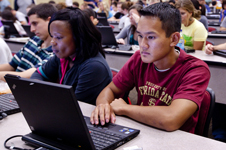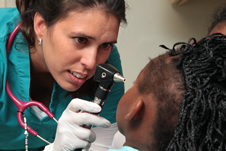For five days during the first week in April, the College of Medicine hosted a six-person accreditation survey team representing the Liaison Committee on Medical Education. The important visit took less than a week, but the college’s effort to make a strong impression was years in the making.
The site visit is a key step in the path to reaccreditation. While there are indications that the visit was a success, the process is not complete. The site visit team's findings will be forwarded to the LCME, which possibly will render a decision about the College of Medicine's reaccreditation during a regularly scheduled meeting in Chicago in October.
“While a number of new medical schools have started since we received our initial accreditation in 2005, we are the newest medical school undergoing the reaccreditation process in this century,” said Alma Littles, senior associate dean for medical education and academic affairs.
The survey team was made up of representatives from six medical schools and included two deans, a professor of internal medicine, a fourth-year medical student, a vice dean for academic affairs and an associate dean for medical education.
The team now will produce the report that will serve as the basis for the LCME vote on whether to approve the College of Medicine’s reaccreditation through 2019. In the report, the survey team will describe the College of Medicine’s educational program and account for how well it complies with accreditation standards.“The LCME states, ‘Institutional accreditation assures that medical education takes place in a sufficiently rich environment to foster broad academic purposes,’” Littles said.
Formal preparations for the site visit began with a committee meeting at the main campus in November 2009, but an argument could be made that preparations actually began as soon as the College of Medicine received its initial full accreditation in February 2005.Since then, the college has opened new regional campuses in Sarasota, Daytona Beach and Fort Pierce and rural clinical training sites in Marianna and Immokalee; graduated six classes; and grown from around 170 medical students to its current full enrollment of 480.
“Celebrating the College of Medicine’s 10th anniversary this past year while reviewing our strategic plan and performing our year-long LCME self-study highlighted how far the medical school has come in our short lifetime,” said John P. Fogarty, who arrived as dean in August 2008.“We have now expanded to full enrollment, fully opened and succeeded at our regional campuses and rural sites, and built a strong research portfolio since the last LCME site visit in 2004.”
The 18-month round of formal preparations leading up to the April 3-7 site visit were devoted to compiling a medical education database used as the basis for performing an institutional self-study.
“The institutional self-study is one of the most important activities we undertake as a College of Medicine,” Littles said. “More than 100 individuals participated directly in our self-study process, and more than 1,000 faculty members and students responded to surveys that were implemented as a part of that process. Five subcommittees and an independent student self-study committee collected more than 1,300 pages of data, responding to the 125 LCME accreditation standards.”
The database mailed to the LCME in February was packed into eight boxes and weighed more than 300 pounds. Those boxes contained plenty of success stories that should carry some weight with the survey team.
“Our graduation and match statistics, our strong board scores and student performance with our community model, and the impacts we are having across the state have validated that this model is working and working very well,” Fogarty said. “We appreciated having an opportunity to share examples of that success with our site visitors."
In addition to spending 2½ days at the main campus, the survey team split up for visits to regional campuses in Tallahassee, Daytona Beach and Pensacola, along with an afternoon at the rural clinical training site in Marianna. The team met with students from the main campus and from the regional campuses, faculty, administrators, staff, clerkship directors and clerkship faculty.
Accreditation procedures
|
LCME steering committee convenes
|
Dec. 11, 2009
|
|
Educational program database developed and distributed
|
April-September 2010
|
|
Steering committee prepares summary report
|
January
|
|
Final database and self-study summary submitted
|
Feb. 9-10
|
|
Accreditation survey visit
|
Oct. 4-6
|




